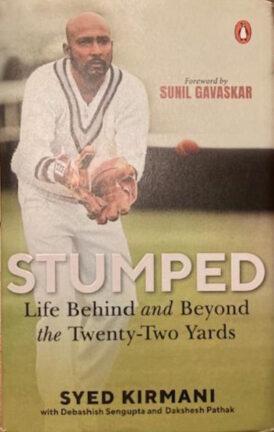Stumped
Martin Chandler |Published: 2024
Pages: 173
Author: Kirmani, Syed, Sengupta, Debashish and Pathak, Dakshesh
Publisher: Penguin Random House India
Rating: 2 stars

This book about the life and times of former Indian wicketkeeper Syed Kirmani immediately brought to mind the story of the curate’s egg. The good parts of the book are the idea of it, and the way the authors have gone about their task and the photographs. The bad parts are, well I will come on to those.
For those under 50 years of age Kirmani’s name is unlikely to be a familiar one, but he was a thoroughly competent wicketkeeper batsman who played in 88 Tests between 1976 and 1986 and his record certainly stands comparison with that of his immediate predecessor, the flamboyant and immensely popular Farokh Engineer, as well as that of his successor, Kiran More.
With all due respect to Kirmani he was not a superstar and, as a cricketer, was a man who got on with the job series in and series out rather than one who is remembered for any particularly stellar feats. That said despite the turning point of the match being Kapil Dev’s stunning catch to dismiss Vivian Richards Kirmani’s 14 runs, faultless glovework and catch to dismiss Faoud Bacchus in India’s famous 1983 World Cup is certainly memorable.
The layout of the book is an interesting one. The first 74 pages are Kirmani’s own story so, effectively, an autobiography. That is the followed by his two co-authors acting as biographers and their contributions are followed by a series of tributes from the great and the good of Indian cricket. Finally there is also an instructional chapter which, I have to say, is of such brevity as to not be of any great value if for no other reason than I cannot imagine that too many of an age where coaching will do them any good are going to be reading the book.
But that one is but a minor problem. The real issue with the book is that it appears no fact checking has been done, and the errors are not mere matters of detail, but the sort that make you doubt the veracity of everything you read. Examples are the suggestion that Farokh Engineer, who didn’t make the trip, kept wicket for India during their famous series victory in the Caribbean in 1970/71, and that Pochiah Krishnamurthy wasn’t there when in fact he kept in all five Tests, the only ones of his career,
According to Kirmani Andy Roberts and Michael Holding were two of the West Indies pace bowlers in that historic series, although in fact Roberts didn’t debut for another four years and Holding for five. On the subject of Holding he, with the christian name Robert, is also stated to have been involved in the West Indies series in India in 1974/75. Add to that a not inconsiderable number of misspellings and grammatical errors and you have a book in respect of which the pleasure of reading it is much diminished.
The other problem with the autobiographical section is that it is, I am afraid, rather too much about Kirmani himself. That he has legitimate grievances against selectors and administrators I do not doubt, and there is interest in the points he makes. That said there is so much about those issues that at times his reader begins to wonder whether he actually enjoyed his career at all.
And there is another disappointment. Kirmani might well prove to be the last wicketkeeper to play with a bowling attack dominated by spinners. In his early Tests he would be keeping to three of the great quartet of Bedi, Prasanna, Chandra and Venkat. Even in his final Test India were still playing three front line spinners in Shivlal Yadav, Ravi Shastri and Laxman Sivaramakrishnan. His thoughts on the changes the game has been through would have been very welcome.
In relation to the biographical chapters those suffer too from factual errors and misspellings and at times the prose itself struck me as very florid – Neville Cardus and one or two others have had the style and command of the English language to get away with that but not, for me at least, Sengupta and Pathak. The narrative is also too hagiographical to add anything of substance to what Kirmani has already written.
The tributes chapter is also hagiographical, but that is only to be expected and this is certainly the most satisfying part of the book and a great deal of effort must have gone in to securing the assistance of 29 contributors, opponents of Kirmani as well as teammates. There is still the occasional glitch however, Mike Brearley’s surname being misspelt, although he is at least allowed to spell Alan Knott’s surname correctly – to put that in context Alan Nott would be the ‘keeper in a distinctly useful misspelled name eleven that could be put together from the proof reading slips.
Had the publisher simply invested in a rigorous editor Stumped would have been a better book and indeed, in the right hands Kirmani’s life, times and thoughts on the game could have produced a very good one. Sadly whilst it is not wholly lacking in merit this is not that book.






Leave a comment